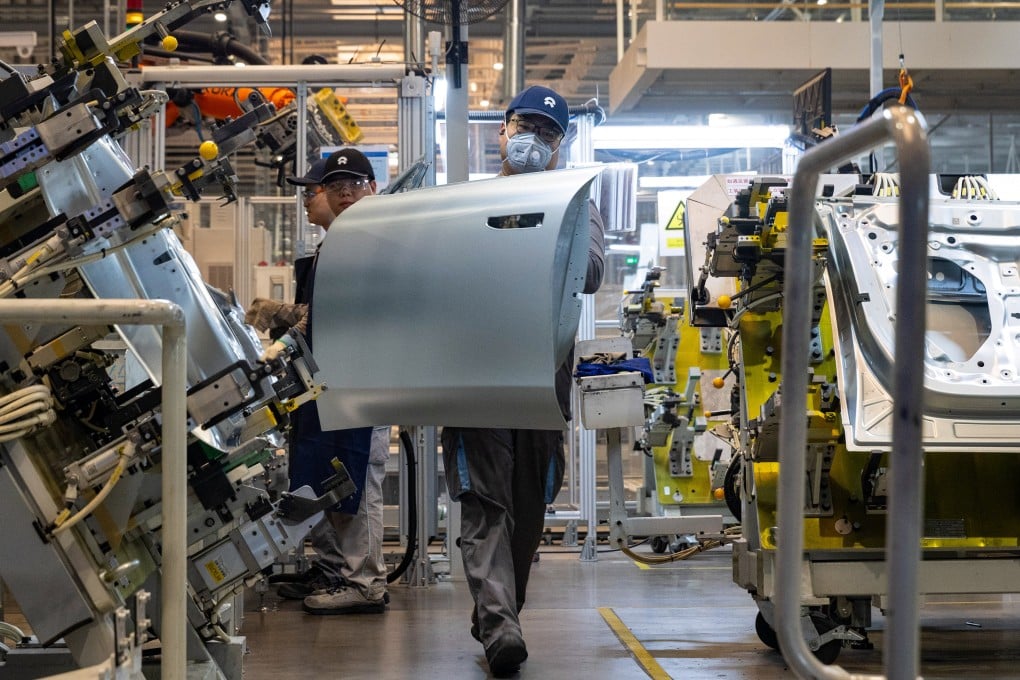Articles in this Cluster
30-04-2025
China's manufacturing activity plummeted in April due to the trade war with the US, with the Purchasing Managers' Index (PMI) dropping to 49.0, its lowest reading since December 2023. The US tariffs, which reached 145% on many Chinese products, came into force in April, prompting Beijing to respond with 125% duties on US imports. Economists warned that the trade disruption could threaten businesses, increase consumer prices, and cause a global recession, with many revising down their economic growth forecasts for China. China's economy, already struggling to recover from the Covid-19 pandemic, is also grappling with sluggish domestic demand and a property sector crisis, with growth expected to expand just 3.5% this year.
30-04-2025
Asia-Pacific markets traded mixed on Wednesday as investors parsed a slew of key economic data in the region. Japan's Nikkei 225 rose 0.14%, while Australia's S&P/ASX 200 traded flat. China's CSI 300 was also flat after the country's manufacturing activity fell more-than-expected into contractionary territory in April. Australia's first-quarter inflation rose 2.4%, higher than expected. The Bank of Japan is expected to hold rates at 0.5% when its policy meeting concludes on Thursday. Overnight, US stock markets closed higher, with the Dow Jones Industrial Average rising 0.75% to 40,527.62.
30-04-2025
China has passed a law aimed at promoting its private sector, amid a trade war with the US and a sluggish economy. The 78-article Private Economy Promotion Law, which comes into effect on May 20, stipulates measures to promote fair competition, encourage private firms to participate in scientific projects, and safeguard their economic rights. Experts say the law's success will depend on its implementation, and note that it addresses issues such as unfair targeting of private businesses and "profit-driven" law enforcement.
30-04-2025
China's factory activity contracted in April as the country's purchasing managers' index (PMI) fell to 49, a 16-month low, due to the impact of US tariffs and trade tensions, with experts predicting further weakening of macro data in the second quarter.
30-04-2025
Traders in Yiwu, China's largest wholesale market, are adjusting to a decline in US buyers due to the US-China trade war, but are being cushioned by a growing global customer base. US buyers are now scarce, with languages like Arabic, Russian, and Spanish more commonly heard. The US accounted for less than 15% of Yiwu's exports in 2024, and vendors are diversifying their clients to regions like South America to mitigate the impact of US tariffs.
30-04-2025
Investors are flocking to emerging market bonds as the US Treasurys selloff continues, driven by a desire to diversify away from the US market. Emerging market local currency bond yields have decreased by 13 basis points since April 2, while the benchmark 10-year Treasury yield has risen by more than 7 basis points. Experts say that countries such as Mexico, Brazil, and South Africa may see increased demand for their bonds, and that emerging market local currency fixed income tends to perform well when the US dollar is under pressure. Investors are beginning to view emerging markets through a "new lens," driven by the relative underperformance of US risk assets and the potential for opportunities abroad.
30-04-2025
Bank of America's Athanasios Vamvakidis forecasts that the British pound will rise above $1.50 in 2026, returning to its pre-Brexit value. The pound has gained around 7% against the dollar since the start of the year and is expected to reach $1.43 by the end of 2025 and $1.54 by the end of 2026, driven by factors such as the U.K.'s services-oriented economy and expected interest rate cuts from the Bank of England. Other investment banks, including Deutsche Bank and Goldman Sachs, also forecast further upside for the pound.
30-04-2025
Stock futures were lower early Wednesday as traders awaited a batch of economic data, including the first reading of the first quarter's gross domestic product and the personal consumption expenditures price index for March. The S&P 500 and Nasdaq 100 futures slipped 0.51% and 0.66%, respectively, while Dow Jones Industrial Average futures added 0.75%. The major averages ended Tuesday higher after comments from Commerce Secretary Howard Lutnick and President Donald Trump suggesting a potential trade deal with India. April has been a volatile month for markets, but the S&P 500 has narrowed its losses to 0.9% after briefly entering a bear market on April 7.
30-04-2025
European stock markets were expected to open mixed on Wednesday as investors awaited earnings reports from major companies such as Airbus, Mercedes, and Volkswagen, as well as euro zone GDP data. The Stoxx 600 index had risen for a sixth consecutive session on Tuesday. UBS reported a better-than-expected quarterly profit, while Volkswagen's profit dropped 37% due to the impact of US tariffs. Economists expect euro zone GDP to have grown 0.2% in the first quarter. Meanwhile, US trade talks continued, with President Donald Trump signing an executive order easing some automotive tariffs.
30-04-2025
German auto giant Volkswagen reported a 37% drop in first-quarter operating profit to 2.9 billion euros ($3.3 billion) due to the impact of U.S. tariffs on the global car industry. Despite a 2.8% increase in sales revenue to 77.6 billion euros, the company cited special effects and a volatile global economic situation. Volkswagen's CFO stated that the company will focus on maintaining a competitive cost base amidst uncertainty. The company expects operating return on sales, net cash flow, and net liquidity to be at the lower end of annual forecasts due to political uncertainty and trade restrictions.
